
Small-scale apple and pear production in Argentina’s Valle Alto could disappear unless there are drastic changes to the structure of the industry.
This is the stark conclusion of Sebastián Hernández, president of the Rió Negro and Neuquén Fruit Producers Federation, who says the growers face a desperate situation because the prices they are being paid do not allow them to meet even the basic obligations of keeping their plantations running.
With production costs averaging ARS5.5/kg and producers receiving ARS3 per kilo of apples and ARS4-5 per kilo of pears, the situation is unsustainable, Hernández said, unless costs are dramatically reduced.
In the latest of a series of protests against rising input costs, producers gave away 40 tonnes of fruit to crowds gathered on the highway between Neuquén and Cipolletti.
Hernández noted that producing a carton of apples in Argentina costs a minimum of US$18, while in Chile it was US$12. With only the big grower-marketers having direct access to export markets, smaller producers are forced to sell on the domestic market, where demand has stagnated due to high prices and a fall in consumer purchasing power.
According to the latest consumer research carried out by the federation, Argentineans buy on average between 4 and 5kg of fruit per year, whereas a few years ago the average was 10-12kg.
Even the sharp fall in production this season has not been enough to raise the price paid to producers. The region has the potential to produce 1.2m tonnes of apples and pears, but this season it is estimated that only half this amount will be harvested due to widespread damage caused by frosts and hailstorms.






No comments yet